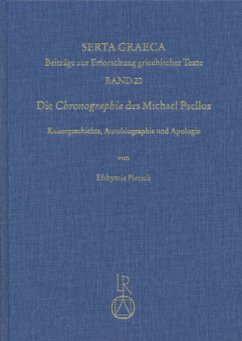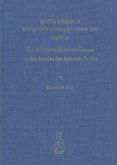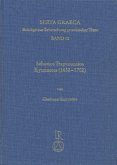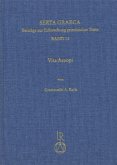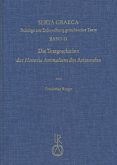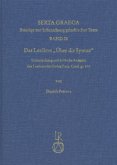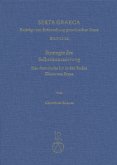Die Chronographia des Michael Psellos (1018 - 1078?), ist ein Meisterwerk byzantinischer Historiographie. Sie behandelt die Geschichte der byzantinischen Kaiser zwischen 976 und 1077 und die staatsmännische Laufbahn ihres Autors in der zweiten Hälfte dieses Zeitraums. Psellos' Auswahl seiner inhaltlichen Schwerpunkte wie auch seine Art und Weise, diese Themen zu behandeln, hat unter Forschern der Neuzeit immer wieder Anlaß zu Kontroversen und Irritationen gegeben. Die wichtigsten Diskussionspunkte, sind dabei die Fokussierung der Erzählungen auf die Persönlichkeiten der jeweiligen Kaiser sowie die starke Präsenz der Person des Autors in seinem Werk, die sich unter anderem in langen autobiographischen Exkursen manifestiert. Vor allem der zweite Punkt ist in der Forschung oft als eine unzulässige Überschreitung historiographischer Gattungsgrenzen interpretiert und als Charakterschwäche des Autors ausgelegt worden.
Hauptgegenstand dieser Arbeit sind die autobiographischen Elemente der Chronographia. Die Autorin untersucht, inwiefern diese Elemente eine literarische Funktion innerhalb der Gesamtökonomie des Werkes des Michael Psellos erfüllen. Es wird gezeigt, in welcher Weise Psellos die Darstellung und Bewertung aufeinanderfolgender Kaiserpersönlichkeiten als Mittel gebraucht, um durch sie seine eigene politische Apologie darzulegen. Dass die Chronographia mit ihrem autobiographisch-apologetischen Charakter den Rahmen klassischer historiographischer Gattungsnormen sprengt, lässt sich aber nicht nur, wie in der bisherigen Forschung, als literarischer Fehltritt, sondern durchaus auch positiv, als literarische Innovation würdigen. Diese ist einerseits vor dem Hintergrund vielfältiger und heterogener Traditionen in der griechischen Historiographie zu sehen, auf die Psellos zurückgreifen konnte und zwischen denen die Grenzen teilweise fließend waren, und andererseits der ab dem 10. Jahrhundert erkennbaren Tendenz zur Hervorhebung des Individuums in der byzantinischen Kunst und Literatur. Nicht zuletzt ist diese Innovation auf eine dem Autor eigene literarische Selbstständigkeit und Originalität zurückzuführen.
Die vorliegende Interpretation der Chronographia ist im Rahmen einer neuen Haltung in der byzantinistischen Forschung zu verstehen, die byzantinische Geschichtswerke nicht nur als Quellen historischer Informationen, sondern auch als künstlerische Produkte sieht und sie nicht nur als Nachahmungen klassischer Vorbilder, sondern auch als eigenständige Erscheinungen würdigt.
Auf der Basis einer solchen Betrachtungsweise lässt sich Psellos' Vorgehen tatsächlich nicht als bloße literarische Verirrung, sondern ganz im Gegenteil als literarische Errungenschaft und zumindest äußerst interessanter, innovativer literarischer Versuch begreifen.
Hinweis: Dieser Artikel kann nur an eine deutsche Lieferadresse ausgeliefert werden.
Hauptgegenstand dieser Arbeit sind die autobiographischen Elemente der Chronographia. Die Autorin untersucht, inwiefern diese Elemente eine literarische Funktion innerhalb der Gesamtökonomie des Werkes des Michael Psellos erfüllen. Es wird gezeigt, in welcher Weise Psellos die Darstellung und Bewertung aufeinanderfolgender Kaiserpersönlichkeiten als Mittel gebraucht, um durch sie seine eigene politische Apologie darzulegen. Dass die Chronographia mit ihrem autobiographisch-apologetischen Charakter den Rahmen klassischer historiographischer Gattungsnormen sprengt, lässt sich aber nicht nur, wie in der bisherigen Forschung, als literarischer Fehltritt, sondern durchaus auch positiv, als literarische Innovation würdigen. Diese ist einerseits vor dem Hintergrund vielfältiger und heterogener Traditionen in der griechischen Historiographie zu sehen, auf die Psellos zurückgreifen konnte und zwischen denen die Grenzen teilweise fließend waren, und andererseits der ab dem 10. Jahrhundert erkennbaren Tendenz zur Hervorhebung des Individuums in der byzantinischen Kunst und Literatur. Nicht zuletzt ist diese Innovation auf eine dem Autor eigene literarische Selbstständigkeit und Originalität zurückzuführen.
Die vorliegende Interpretation der Chronographia ist im Rahmen einer neuen Haltung in der byzantinistischen Forschung zu verstehen, die byzantinische Geschichtswerke nicht nur als Quellen historischer Informationen, sondern auch als künstlerische Produkte sieht und sie nicht nur als Nachahmungen klassischer Vorbilder, sondern auch als eigenständige Erscheinungen würdigt.
Auf der Basis einer solchen Betrachtungsweise lässt sich Psellos' Vorgehen tatsächlich nicht als bloße literarische Verirrung, sondern ganz im Gegenteil als literarische Errungenschaft und zumindest äußerst interessanter, innovativer literarischer Versuch begreifen.
Hinweis: Dieser Artikel kann nur an eine deutsche Lieferadresse ausgeliefert werden.
"According to the classical textbook by Hans Henny the five factors: climate, parent material, vegetation, topography and time are responsible for soil formation on earth. Many studies have identified the processes of soil formation and degradation in temperate climates. However, in comparison only relatively few studies have been conducted on soild in the Tropics. The book by Pietsch attempts to close this gap by presenting a detailed analysis of soil information and degradation in these climatic regions. Specifically, the study deals with pedological aspects of the island Socotra (Yemen) which is situated in the dry Tropics. Detailed soil descriptions in combination with micromorphological, physical and chemical analyses are used to describe the soils on this island. The aim of the study was to better understand the process of soil development and elucidate indicators for soil degradation. All of the soil forming factors by Jenny, despite not explicitly referred to in the text, are addressed within this study. (...)
In conclusion, the book provides an invaluable resource for all who would like to understand the process of soil formations and degradation in the dry Tropics. The information are important for the development of sustainable agricultural practices in dry tropical climatic regions of the world and therefore have implications beyond the island of Socotra. (...) The author
has to be congratulated for the detailed analyses showing that soils are an important non-renewable resource in these regions of the world. (...) Without doubt the information presented in this volume will provide a resource for sustainable management of soils indry tropical regions of the world." (In: Erdkunde. Band 61, Heft 4 (2007))"Abschließend sei noch hervorgehoben, daß Efthymia Pietschs Psellos-Buch einem Lust macht, die Chronographia (noch) einmal zu lesen und darauf zu achten, was dieser durchtriebene Autor eigentlich sagen wollte."
In: Jahrbuch der österreichischen Byzantinistik. 57 (2007). S. 394-397.
-----------------------------
"According to the classical textbook by Hans Henny the five factors: climate, parent material, vegetation, topography and time are responsible for soil formation on earth. Many studies have identified the processes of soil formation and degradation in temperate climates. However, in comparison only relatively few studies have been conducted on soild in the Tropics. The book by Pietsch attempts to close this gap by presenting a detailed analysis of soil information and degradation in these climatic regions. Specifically, the study deals with pedological aspects of the island Socotra (Yemen) which is situated in the dry Tropics. Detailed soil descriptions in combination with micromorphological, physical and chemical analyses are used to describe the soils on this island. The aim of the study was to better understand the process of soil development and elucidate indicators for soil degradation. All of the soil forming factors by Jenny, despite not explicitly referred to in the text, are addressed within this study. (...)
In conclusion, the book provides an invaluable resource for all who would like to understand the process of soil formations and degradation in the dry Tropics. The information are important for the development of sustainable agricultural practices in dry tropical climatic regions of the world and therefore have implications beyond the island of Socotra. (...) The author
has to be congratulated for the detailed analyses showing that soils are an important non-renewable resource in these regions of the world. (...) Without doubt the information presented in this volume will provide a resource for sustainable management of soils indry tropical regions of the world."
In: Erdkunde. Band 61, Heft 4 (2007).
In conclusion, the book provides an invaluable resource for all who would like to understand the process of soil formations and degradation in the dry Tropics. The information are important for the development of sustainable agricultural practices in dry tropical climatic regions of the world and therefore have implications beyond the island of Socotra. (...) The author
has to be congratulated for the detailed analyses showing that soils are an important non-renewable resource in these regions of the world. (...) Without doubt the information presented in this volume will provide a resource for sustainable management of soils indry tropical regions of the world." (In: Erdkunde. Band 61, Heft 4 (2007))"Abschließend sei noch hervorgehoben, daß Efthymia Pietschs Psellos-Buch einem Lust macht, die Chronographia (noch) einmal zu lesen und darauf zu achten, was dieser durchtriebene Autor eigentlich sagen wollte."
In: Jahrbuch der österreichischen Byzantinistik. 57 (2007). S. 394-397.
-----------------------------
"According to the classical textbook by Hans Henny the five factors: climate, parent material, vegetation, topography and time are responsible for soil formation on earth. Many studies have identified the processes of soil formation and degradation in temperate climates. However, in comparison only relatively few studies have been conducted on soild in the Tropics. The book by Pietsch attempts to close this gap by presenting a detailed analysis of soil information and degradation in these climatic regions. Specifically, the study deals with pedological aspects of the island Socotra (Yemen) which is situated in the dry Tropics. Detailed soil descriptions in combination with micromorphological, physical and chemical analyses are used to describe the soils on this island. The aim of the study was to better understand the process of soil development and elucidate indicators for soil degradation. All of the soil forming factors by Jenny, despite not explicitly referred to in the text, are addressed within this study. (...)
In conclusion, the book provides an invaluable resource for all who would like to understand the process of soil formations and degradation in the dry Tropics. The information are important for the development of sustainable agricultural practices in dry tropical climatic regions of the world and therefore have implications beyond the island of Socotra. (...) The author
has to be congratulated for the detailed analyses showing that soils are an important non-renewable resource in these regions of the world. (...) Without doubt the information presented in this volume will provide a resource for sustainable management of soils indry tropical regions of the world."
In: Erdkunde. Band 61, Heft 4 (2007).

